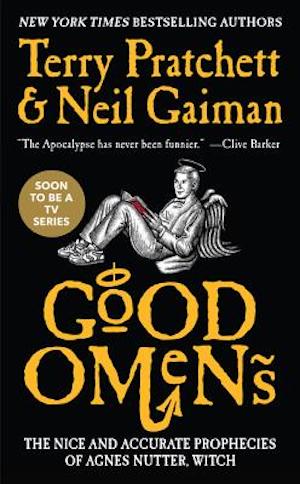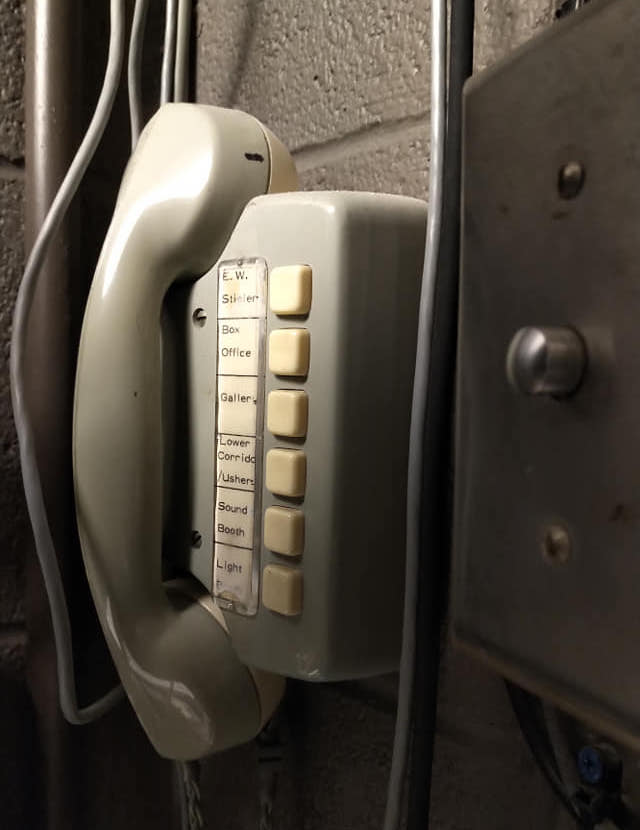I work part-time in an older university theatre where I frequently encounter relics of bygone eras. One of note: a disused communication system whose handsets survive in parts of the building that have not yet been renovated (pictured below).
To give you an idea how old those are: the Earl Stieler whose name adorns them retired in 1991.1 I am not sure if the handsets still work, as I’ve not had the opportunity to test the system. However, when held to the ear, they produce eerie whispering sounds, as if from a realm of despairing and lost souls. Perhaps I will round up an orphaned, friendless voluntold and see what happens when two handsets are used simultaneously. The results cannot help but be educational!
A quirk of old-timey phones and phone-like devices is that they gave no hint as to who might be calling. It could be your beloved granny. It could be Satan.2 The only way to find out was to listen. Even then, one could not be sure the caller was who they claimed to be…
The Lord of the Rings by J.R.R. Tolkien (1954-55)

Although the main plot centers around an accessory-based stratagem to confound would-be world-conqueror Sauron, significant subplots center on Middle-earth’s answer to telephones. The Elf-made palantírs permitted communication as well as surveillance over vast distances. In a sense, they fill a niche much like today’s smartphones. They could be a mixed blessing.
There were several problems with the palantírs. They might lead their users to focus on unimportant matters and ignore important events. More sinisterly, Sauron has a palantír. Anyone gazing into a palantír risks encountering Sauron’s corrupting gaze looking back at them.
People using palantírs tend to be ignorant of the dangers or foolishly confident that they can avoid them. This includes Sauron. Sauron doesn’t have to worry about being corrupted by contact with Sauron (or alternatively, can never escape said corruption), but he is just as vulnerable as other users to misinterpreting what he sees on the palantír, with significant implications for the plot.
Sam, This is You by Murray Leinster (Galaxy Maxazine, 1955)

Batesville and Rappahannock Telephone Company linesman Sam Yoder is surprised to receive a call on a line he knows is dead. Sam is even more surprised to hear his own voice on the other end of the line. The tale the other Sam spins is bizarre, but one that promises big benefits to linesman Sam.
The other Sam is calling from ten days into Sam’s future. Armed with what Sam-future tells him, Sam-now can make both of them rich. Knowing as he does how things will play out, Sam-future judiciously conceals certain details from his past self. After all, why worry the poor sap over calamities about which he will learn soon enough?
Modern readers should be aware that Leinster was of his time in his depiction of women characters. Which is to say, often misogynist.
Many characters armed with foreknowledge of the next ten days might be foolishly tempted into intervening in national or international affairs. Sam, on the other hand, keeps his eye on the ball. There were no doubt any number of disasters going on the background that a quick call the authorities could have mitigated. Sam ignores them all. Sam focuses on applications that will make him money and will not invite awkward questions.
“When You Hear the Tone” by Thomas N. Scortia (Galaxy Magazine, 1971)

Having spent eighty years honing his capacity for antisocial irritability, Mark Fleiker is a bitter, lonely old man. Repeated phone calls from a stranger are not welcome. Repeated phone calls from an unfamiliar woman whose conversation makes it clear she is in a different year entirely should be especially unwelcome.
And yet, having spent his entire life alone, companionship now seems a welcome possibility to Mark…provided he can circumvent the decades separating Mark from the mysterious woman on whom he is now fixated.
The title is, of course, a reference to what is now no doubt a long-vanished service in which the phone company could provide the time. Small children desiring to be shouted at by irate parents could easily call this service a dozen times an hour. Ask me how I know.
Good Omens by Terry Pratchett and Neil Gaiman (1990)

Doomsday is ordained, or so the best (and worse) authorities assert. The demon Crowley and the angel Aziraphale having become fond of Earth, they would prefer the planet and all on it not perish. Therefore, the pair proceed to bollox up the grand plan to bring an end to it all.
At one point, Crowley avoids an uncomfortable conversation with high-ranked demon Hastur by tricking his demonic overseer into a convenient answering machine. It’s a trap that should contain Hastur forever…or until an unlucky telemarketer calls Crowley’s number.
Roughly 95% of all the phone calls I get are from scammers, telemarketers, and their ilk. It is very annoying that a once-useful technology is now only a medium for vexation. Nevertheless, it would probably be wrong to commodify the arrangement Crowley creates with Hastur and the answering machine. But I bet one could make a ton of money selling such a service….
“The Black Phone” by Joe Hill (20th Century Ghosts, 2004)

Kidnapped by the Grabber, Finney is imprisoned in a basement. The basement contains an old phone… but the line is dead and Finney cannot use it to call for help. Or rather, Finney cannot call the mundane authorities.
The Grabber has kidnapped and killed previous victims. Through the black phone, the shades can share what they learned about the Grabber with Finney. If Finney is lucky, and cunning, this might be enough to save him.
Is Finney a reference to famed author Jack Finney? And is anyone else compelled, as I am, to start humming a certain Wobblies-related3 tune when they see Joe Hill’s name?
***
I considered and discarded a dozen possibilities before settling on these five. There are therefore lots of appropriate stories that were not mentioned above, since I do not have the space to mention every possibility! Feel free to make the case for your favourite stories. Comments are below.

In the words of fanfiction author Musty181, four-time Hugo finalist, prolific book reviewer, and perennial Darwin Award nominee James Davis Nicoll “looks like a default mii with glasses.” His work has appeared in Interzone, Publishers Weekly and Romantic Times as well as on his own websites, James Nicoll Reviews (where he is assisted by editor Karen Lofstrom and web person Adrienne L. Travis) and the 2021, 2022, and 2023 Aurora Award finalist Young People Read Old SFF (where he is assisted by web person Adrienne L. Travis). His Patreon can be found here.
[1]A meaningless coincidence: after I finished the first draft of this, I discovered I wrote it five years to the day after Earl died.
[2]No offense to those of you whose granny *is* Satan.
[3]Unfamiliar with the Wobblies? Encyclopedias are your friend. I used to say search engines were your friend, but thanks to the application of large language models to search engines, search engines are just as likely to be your bitter enemy.











Sorry, Right Number by Joe Hill’s dad springs immediately to mind.
Peter S. Beagle’s short story “Kaskia” has a lonely man chatting online with someone he assumes is a 10-12-year-old girl. The chat has just connected him to…elsewhere.
And the movie “Frequency”, where Jim Caviezel gets to talk to his father Dennis Quaid via ham radio decades after the latter’s death.
The use of the phones in Douglas Adams’ Dirk Gently’s Holistic Detective Agency comes immediately to mind, with one influential character unable to move on until he finishes the phone call he was trying to make to his sister — cut short by a traffic accident. And then there’s the phone owned by one Reg Chronotis, permanently on the fritz until he finally got a competent technician in to repair it…with interesting Consequences.
I went into this expecting a reference to Mugwump 4 by Robert Silverberg, and if you won’t provide it I will! So there!
In William F. Nolan’s “Dead Call” a recently deceased friend calls the narrator to sell him on death, essentially.
“The Love Letter” (1959) by Jack Finney. A man in the present-day, finding an unmailed love letter in a secret drawer in an antique Victorian desk, uses the drawers to communicate via letters with the woman who wrote the original letter. Problem is, each drawer can only be used once.
Telephone call for Mr Carter!
“You fool, Warren is dead!”
Oh! Oh! The footnoterphone in Jasper Fforde’s wonderful Thursday Next series, where a person inside a book can talk to a person outside the book via the use of footnotes, requiring the reader to continually glance from the top of the page to the footnotes on the bottom in order to follow the conversation. You start thinking “this is stupid, why is he making me do this?” while a slow grin spreads over your face.
Joe Hill gets that a lot, especially as he was named after the other guy.
James Blish wrote a story called “Beep” (later expanded into The Quincunx of Time) in which every message on an interstellar radio is preceded by a mysterious beeping noise. It turns out that this beep is a compressed form of every message sent on the device ever, and a benevolent government agency can analyze the beep to learn about future events.